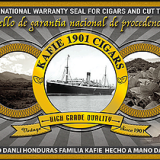Cigars are an art form that require proper care and attention to ensure their enjoyment. Cigar enthusiasts understand the importance of maintaining a humidor, keeping cigars stored at the right temperature, handling them properly and more. There are many nuances involved in caring for your cigars, but there are also some common mistakes that can ruin a cigar-smoking experience if you’re not careful.
Contents:
Humidity is critical when it comes to preserving your cigars; too little humidity and they dry out while too much humidity can cause mold growth or even make them taste bad. Keeping an accurate hygrometer in your humidor will help you monitor the relative humidity levels so you know exactly what condition your smokes are in. Many people make the mistake of overfilling their humidors with boxes of cigars which makes it difficult for air to circulate inside – this means that whatever humidity level is set won’t be evenly distributed throughout all of the cigars.
One thing many cigar aficionados do wrong is leave their smokes out on display or even worse – unwrapped. This exposes them to dust particles which can affect flavor as well as direct sunlight which causes damage from UV rays. It’s best practice to store them away in a cool dark place until they’re ready to smoke, either back in its original box or in individual ziplock bags depending on how long they’ll be left untouched before smoking. Keep any extra wrappers around just incase one gets damaged during transportation and needs replacing prior to enjoying it with friends or colleagues later down the line.
When removing a cigar from its wrapper take care not cut off too much of the cap – this could lead to unraveling during transit or when handled by someone else who isn’t familiar with proper cigar etiquette. The same goes for when lighting up: make sure not use matches that contain sulfur as these will taint your smoke with an unpleasant aftertaste; instead opt for odorless butane lighters or cedar strips specifically designed for lighting up stogies without affecting flavor profiles like traditional lighters would do otherwise.
Another common misstep made by beginners is forgetting about maintenance altogether; leaving cigars forgotten about behind bars and shelves across different rooms inside one’s home often leads toward significant loss due spoilage caused by improper storage conditions being applied over time (i.e. fluctuating temperatures). As such, taking measures such as regularly rotating stock within humidors based upon expiration dates printed onto packaging should become second nature once invested into regular cigar smoking habits.
Breaking the Rules of Humidity
When it comes to cigar care, there are certain unwritten rules that must be followed in order to ensure the best smoking experience. Chief among them is maintaining the correct level of humidity for your cigars. Unfortunately, many smokers don’t understand how important this is and end up making costly mistakes.
One mistake that is often made by those new to cigar care is failing to keep an eye on humidity levels. It’s easy to assume that all you need to do is place your cigars in a humidor and forget about them until you’re ready for a smoke – but this isn’t true at all. The ideal range of humidity should be between 65-72%, so it’s essential that you check your humidor regularly with a hygrometer and adjust as needed.
Another common blunder when caring for cigars is breaking the cardinal rule of temperature control. Many people think they can store their cigars anywhere, even if the room has extreme temperatures or too much sunlight exposure – both of which can damage your precious smokes. To ensure optimal conditions, always make sure the area where you keep your cigars remains between 65-72 degrees Fahrenheit (18-22 degrees Celsius) and away from direct light sources such as windows or lamps. Doing so will help preserve their flavor and prevent potential degradation over time.
Aging Your Cigars Too Quickly
When it comes to cigar maintenance, one of the most common mistakes that many aficionados make is aging their cigars too quickly. Aging a cigar can be an essential part of the process in order to achieve maximum flavor, but rushing this step can have disastrous consequences. When trying to age your cigars properly, patience is key as aging them too rapidly can ruin their overall quality and taste.
Aging your cigars too quickly could lead to overly dry smoke that may not contain all of its intended flavors or aromas. You may end up with a less than enjoyable aftertaste due to the rapid aging process resulting in off-flavors being released from the tobacco leaves prematurely. When aging your cigars improperly you may experience difficulty in lighting or keeping them lit for long periods of time due to lack of moisture content which could ultimately affect the entire smoking experience.
The best way to avoid making these common mistakes when caring for your cigars is by taking things slowly and allowing each batch enough time for proper maturation before consuming them. The ideal conditions for storing and aging your precious stogies are cool temperatures ranging between 65-72 degrees Fahrenheit with a humidity level between 62-70%. By taking care and attention during storage and only moving onto more advanced methods such as cellaring once you have become familiar with basic cigar care practices then you will be able ensure every puff contains its full complement of notes that make it unique.
Storing in Unsuitable Conditions
It is crucial to store your cigars in the proper conditions if you want them to stay fresh and retain their flavor. Unfortunately, many cigar aficionados make the mistake of not taking into account certain environmental factors when storing their cigars, which can lead to a decrease in quality and an unpleasant smoking experience.
The temperature at which you store your cigars is one of the most important factors for optimal preservation. Keeping them too hot or cold can cause significant damage to their structure and taste, as well as encourage the growth of mold and mildew. To ensure that this doesn’t happen, it’s best to keep your cigars stored somewhere with consistent temperatures between 16-20 degrees Celsius (61-68 degrees Fahrenheit). Try to keep relative humidity levels between 65-70%. Too much moisture can also damage tobacco leaves over time.
Another common error is keeping your cigars in plastic bags or containers with airtight seals. While this might seem like a good way to protect against fluctuating temperatures, it could actually be doing more harm than good by trapping too much moisture inside and leading to mold formation on the surface of your stogies. Instead, opt for wooden boxes lined with Spanish cedar since they provide just enough ventilation without compromising on protection from outside elements like dust or bugs.
Forgetting to Rotate Stock
Forgetting to rotate stock is a common mistake when it comes to caring for cigars. If you don’t regularly rotate the cigars in your humidor, some may become over-humidified while others can dry out. To avoid this, check your humidor every few days and move the oldest cigars toward the front of the cabinet or drawer. This will ensure that all of your cigars get an equal amount of humidity and stay in peak condition.
If you keep multiple types of cigars in one box, make sure they are separated by variety so there isn’t any cross contamination between them. You also want to pay attention to their storage temperatures as too much heat can damage their flavor profile and quality. Cigars should be kept at a consistent temperature between 65°F and 70°F (18°C – 21°C). Take special care when removing them from their boxes or packages; mishandling can cause unwanted damage and reduce their lifespan significantly. Cigar aficionados recommend never putting cellophane-wrapped sticks back into its original packaging after opening it because it traps moisture which can affect its flavor and texture over time. Instead, store those wrapped sticks in small airtight containers inside your humidor for maximum freshness and longevity.
Failing to Research Proper Storage Techniques
Failing to research proper storage techniques for cigars is a common mistake that many cigar aficionados make. Not only do improper methods of storing cigars lead to their loss in quality, but it can also cause them to become unsmokable altogether. Cigars should be kept in an environment with consistent humidity and temperature levels; the ideal humidity range for most cigars is around 65-72%. If the relative humidity drops too low, the cigar will dry out and begin to lose its flavor profile; if it rises too high, the tobacco may start to rot or become moldy.
Moreover, keeping your cigars at room temperature is essential for preserving their flavor. Too much heat can damage the wrapper leaves of your cigar, resulting in a taste that is far from pleasant. On top of this, fluctuating temperatures can cause warping or cracking of your cigar’s body as well as problems with burn consistency while smoking. To ensure that these issues are avoided, store your precious smokes in an area where temperatures remain steady between 65-72 degrees Fahrenheit (18-22 degrees Celsius).
Make sure not to forget about airflow when storing cigars. Keeping them tucked away in airtight containers or bags will limit circulation and lead to stale smoke once lit up. This can easily be prevented by investing in humidors which feature ventilation holes – allowing just enough air flow into the chamber without compromising on freshness.
Not Paying Attention to Temperature Fluctuations
One of the most common mistakes cigar aficionados make when caring for their cigars is not paying attention to temperature fluctuations. If your cigars are stored in an area that is too hot, it can cause them to become dry and brittle, leading to a poor smoking experience. Similarly, if the area they are kept in is too cold or humid, they may become moldy or have other undesirable effects. It’s important to be aware of the climate you’re storing your cigars in so that you can ensure they remain at optimal conditions for smoking.
A good rule of thumb when storing cigars is to keep them between 65-72°F with a humidity level around 70%. This will help ensure that your cigars stay fresh and flavorful as long as possible. It’s important to avoid drastic changes in temperature or humidity levels; sudden shifts can negatively affect the taste and quality of your smoke. To prevent this from happening, try keeping any areas where you store your cigars away from direct sunlight or drafts of air.
When handling your cigar collection, always use two hands when moving them around; using one hand can lead to crushing the delicate tobacco leaves inside which would reduce its flavor and aroma profile significantly. Never attempt to re-humidify dried out cigars as this could cause further damage – instead opt for buying fresher sticks from reputable retailers who adhere strictly to proper storage standards for premium quality smokes every time.
Misjudging the Age of a Cigar
Miscalculating the age of a cigar is one of the most common missteps made by novice smokers. A cigar’s age can significantly impact its flavor, texture, and overall smoking experience. Cigars that are too young may not be fully mature, resulting in an unpleasant smoke due to their high acidity levels. On the other hand, cigars that are too old may have lost their potency and become dry or brittle over time.
To ensure your smoking experience is enjoyable every time, it’s important to understand how long cigars typically last before they begin to lose their freshness. While many experts suggest keeping them for no longer than two years from purchase date if stored properly in a humidor, others recommend replacing them after a year or less depending on where you live and how often you smoke. Some types of cigars may require more frequent replacement; Cuban cigars should usually be smoked within six months of being purchased while Nicaraguan blends tend to stay fresh for up to 18 months when stored properly.
It’s also essential to check with your local tobacconist about their aging process as different manufacturers use different techniques which can affect a cigar’s lifespan and taste. Always inspect each individual cigar before purchasing as even those kept in ideal conditions can degrade over time due to changes in temperature or humidity levels during storage and transportation.
Ignoring Best Practices for Traveling with Cigars
Travelling with cigars requires some extra preparation, as improper handling can cause irreparable damage. The key to keeping your cigars safe while on the move is to pay attention to best practices and be aware of the most common mistakes.
One frequent blunder that cigar aficionados make when travelling is failing to use a proper humidor case. Without an airtight seal, your cigars will not be protected from fluctuating humidity levels in different climates or environments. This can lead to dryness or excess moisture, both of which have negative consequences for taste and texture. To ensure your smokes stay fresh throughout your journey, invest in a quality travel-friendly humidor designed specifically for this purpose.
Another mistake often made when transporting cigars is not packing them correctly for flight or other forms of long-distance transport. Your cigars should never be placed directly against hard surfaces like plastic bins during transit; instead, wrap them carefully in bubble wrap or similar protective material before placing them into any type of container for shipping or flying. It’s essential that you monitor temperature changes along the way since extreme temperatures can also harm delicate tobacco leaves if left unchecked over extended periods of time.
With these tips in mind and a little bit of extra care, you’ll find it much easier to enjoy your favorite smokes no matter where life takes you.











